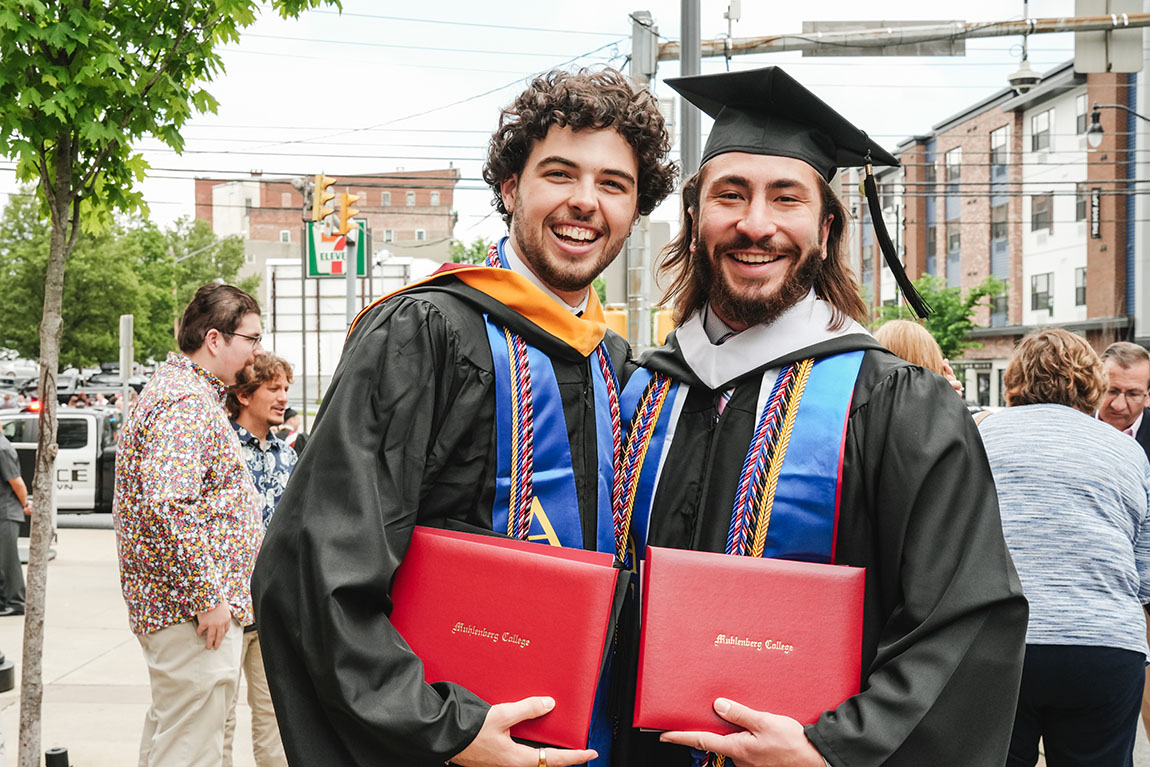Celebrating the Class of 2024
The College’s Commencement honored graduates in a ceremony held in downtown Allentown’s PPL Center.By: Meghan Kita Sunday, May 19, 2024 11:22 AM
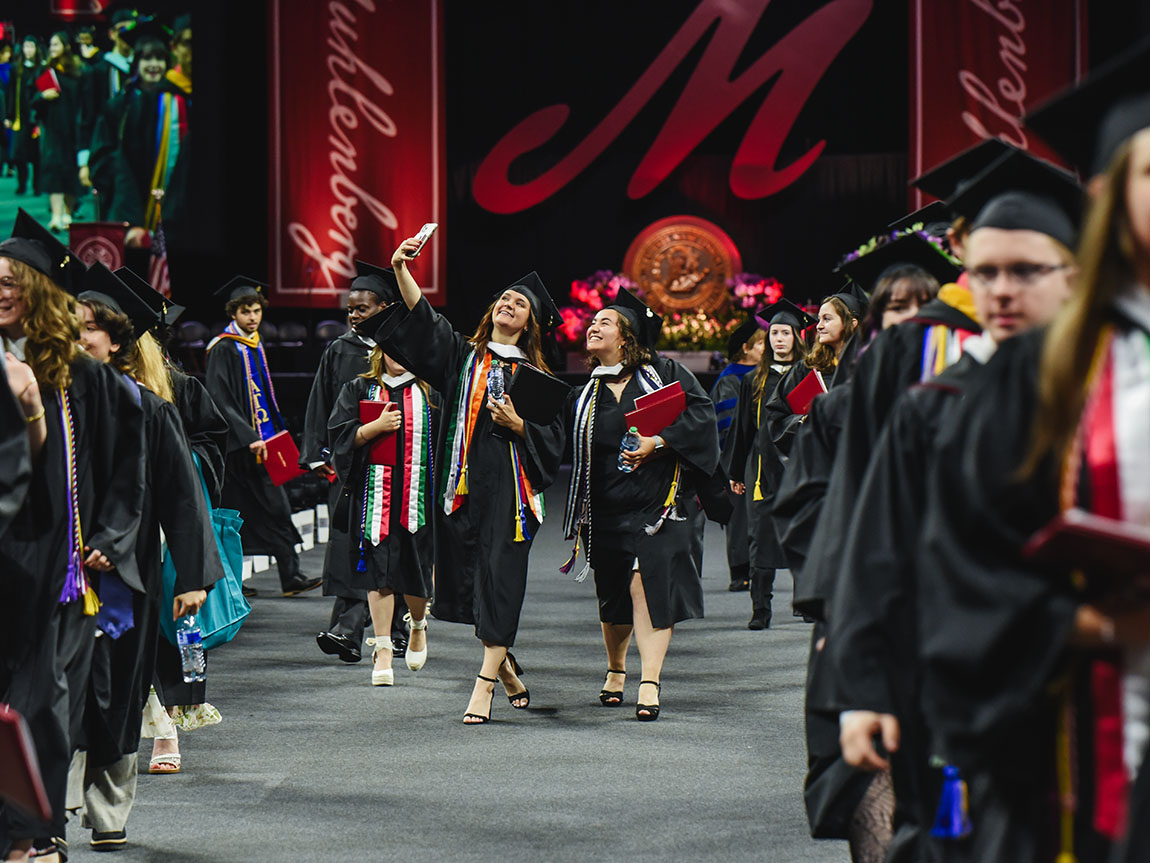 Photos by Kristi Morris/Littlewing Studio
Photos by Kristi Morris/Littlewing StudioVisit our Commencement website to watch speeches and view a recording of the entire commencement ceremony.
On Sunday, May 19, 465 members of Muhlenberg’s Class of 2024, along with their families, their friends and Muhlenberg faculty and staff, gathered in Allentown’s PPL Center to celebrate the College’s 2024 Commencement. A large, enthusiastic crowd welcomed the soon-to-be graduates to the arena, filling most of the space’s lower level seats. The air echoed with whoops and hollers as the class processed in, celebrating the seniors who largely missed their high school graduations due to the onset of the pandemic.
President Kathleen Harring presided over the ceremony. The Commencement address was delivered by honorary degree recipient Julieanna L. Richardson, founder and president of The HistoryMakers, a national nonprofit research and educational institution committed to preserving and making widely accessible the untold personal stories of both well-known and unsung African Americans.
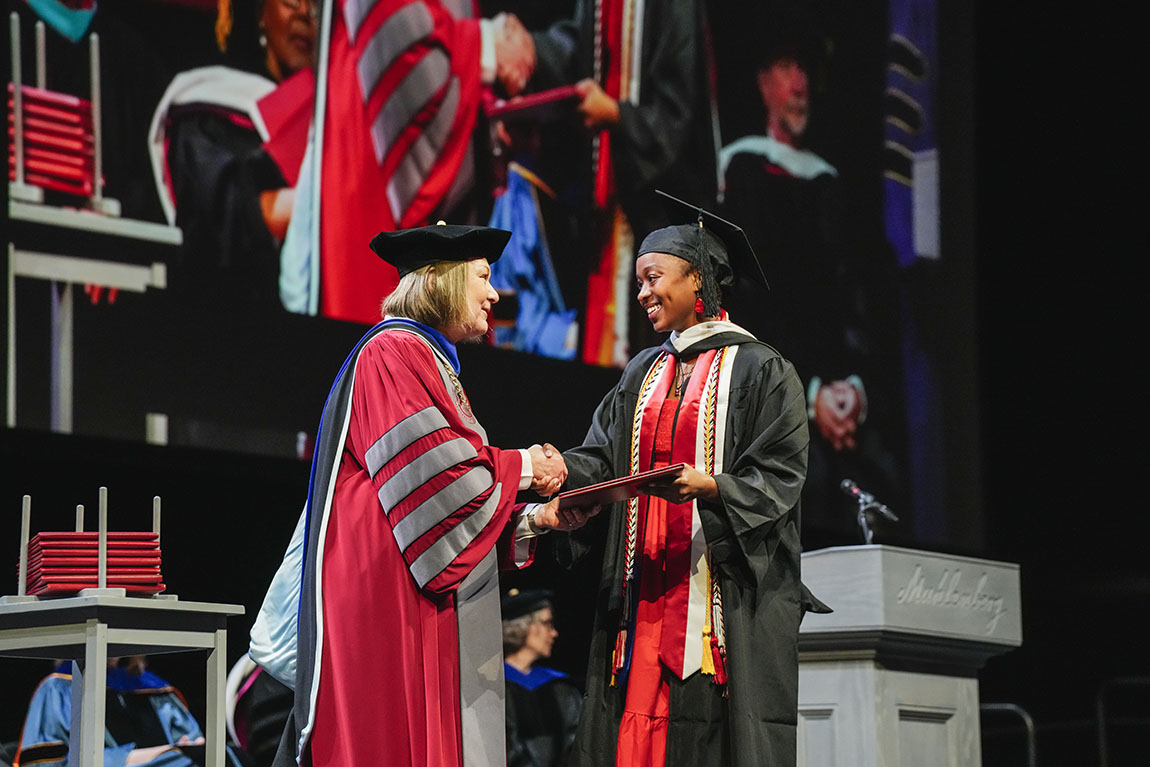
Richardson recalled the unique circumstances the Class of 2024 faced: starting college while the pandemic was still fresh and during a resurgence of racial tensions after the murders of George Floyd, Ahmaud Arbery and Breonna Taylor.
“You made the most of an unusual beginning, and you successfully built community together. That’s why I marvel at you. You are shining examples of what can be done in the worst of times.”
—Commencement Speaker Julieanna L. Richardson
“You came to a campus that only had freshmen … no one to take you by the hand and show you the ropes. Restricted to your room to ensure safety, your teachers learned how to teach online. You made friends through screens. You ate meals surrounded by Plexiglas. You made the most of an unusual beginning, and you successfully built community together. That’s why I marvel at you,” Richardson said, as the audience began applauding. “You are shining examples of what can be done in the worst of times.”
Richardson went on to reflect on the challenges the country and the world are facing in 2024: political divisiveness, wars, the loss of freedoms for marginalized groups. She shared her own experience launching The HistoryMakers, a path that began with work she did as a college student. It’s now the nation’s largest African American video oral history archive.
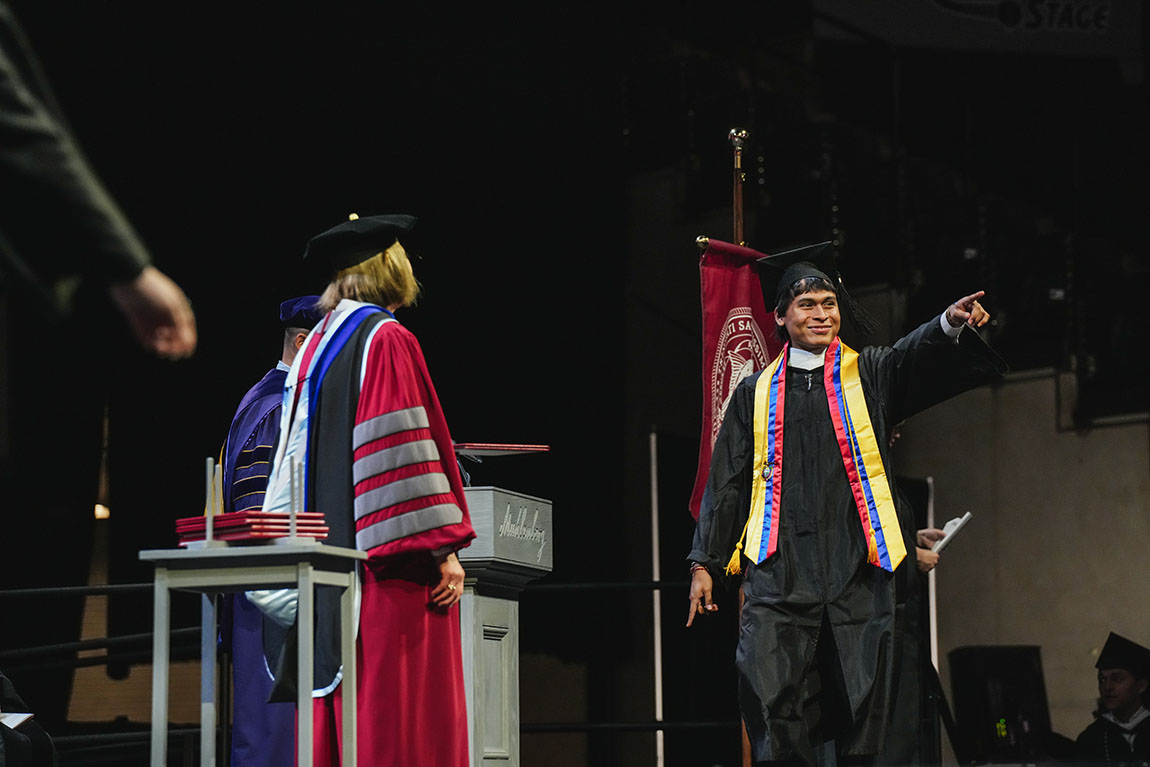
“I tell you this today in order for you to understand the opportunities that are in front of you,” Richardson said. “I want you to grab on to your passions and remember that when passion meets purpose and preparation that life will indeed be your oyster.”
The two graduates who addressed their classmates were Olivia Oberman, a neuroscience major and business administration minor, and Bethany Perez, an accounting major in the School of Continuing Studies.
“Remember that you have the education and tools to make existing doors more accessible and to build plenty of new ones yourself. And, if and when you do these things, think back to your time here as a student where this principle of holding doors open for others may have just set the tone for the rest of your life.”
—Student Speaker Olivia Oberman
“All of us sitting here together have shared a lot of special things,” Oberman said — wearing cardinal-colored clothing, enjoying Muhlenberg’s beautiful campus, lingering in the Wood Dining Commons with friends. “Out of all of the things that we do share, I think it’s of utmost importance to acknowledge our common choice of Muhlenberg. … All of us happened to choose this small but mighty, rigorous institution that presents a felt culture of genuineness, warmth and community.”
Oberman spoke about the Muhlenberg tradition of holding doors for others and suggested that graduates continue to do so, “both physically and figuratively,” as they continue on.
“Remember that you have the education and tools to make existing doors more accessible and to build plenty of new ones yourself,” Oberman said. “And, if and when you do these things, think back to your time here as a student where this principle of holding doors open for others may have just set the tone for the rest of your life.”
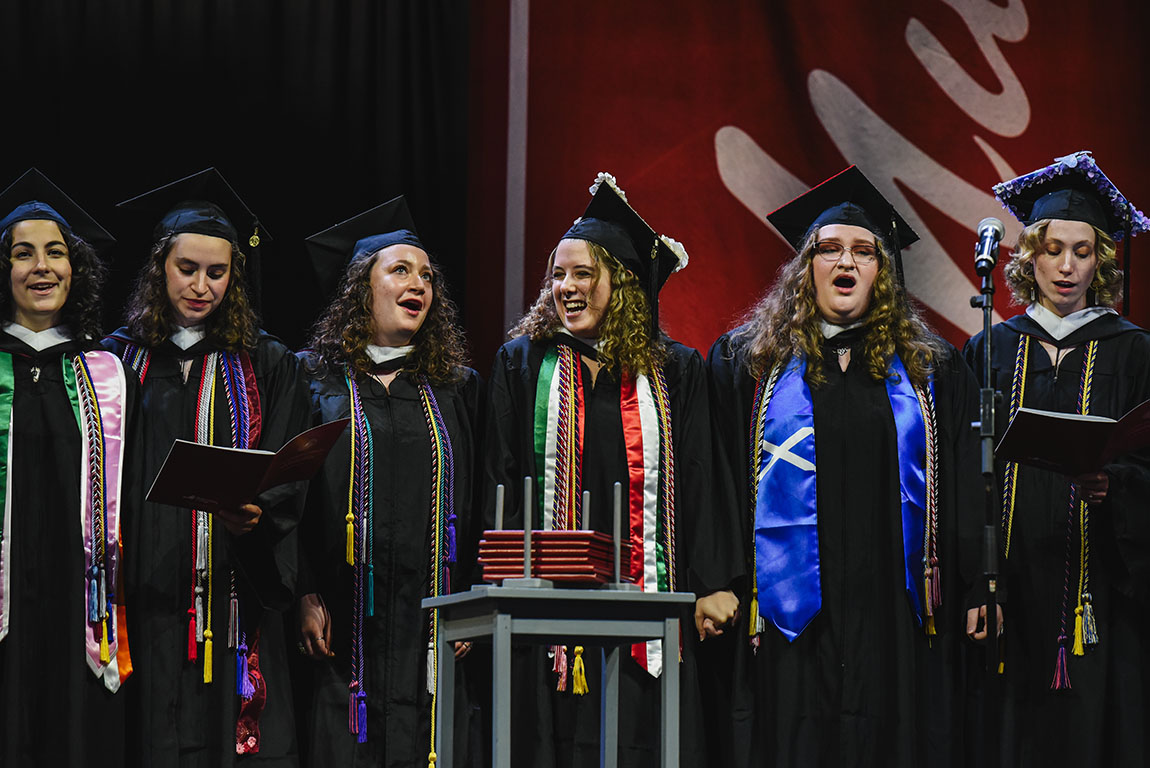
Perez shared her journey to entering college: being homeschooled in Missouri, earning her GED, getting married by the time she was 18. After her job was outsourced in 2021, she decided to pursue an accelerated bachelor’s degree from Muhlenberg. She was pregnant with her second child when she started classes and with her third as she delivered the address. Perez told a story about her young daughter, who has seen her completing her schoolwork for most of her life.
“Who’s watching you work for your goals?” Perez asked. “If my daughter, who’s not even 4, is watching and aware of me working hard to earn something, I’m sure you all have people in your lives, watching you work for your dream. You might not be working for them, but whatever your motivating factor is, you are setting an example of hard work to everyone around you.”
Twelve members of the Class of 2024 were co-valedictorians: Maya Brooks, a political science major; Megan Bruhn, a psychology major; Joshua Castro, a computer science and business administration double major and analytics minor; Nicole Christian, a biology major; Matthew Klinger, a philosophy/political thought major; Brooke Lloyd, a psychology major and studio art and women’s & gender studies double minor; Nicole Randazza, a biology major; Rose Romano, a psychology major and women’s & gender studies minor; Jessica Rosen, a sustainability studies major and innovation & entrepreneurship minor; Courtney Sheckler, a psychology major; Nesya Sloane, a chemistry major; and Felica Wong, a biology major.
Dylan De Magistris, a music and finance double major, and Rosie Gilbert, a public health major and Jewish studies minor, received Alumni Association Future Alumni Leader Awards.
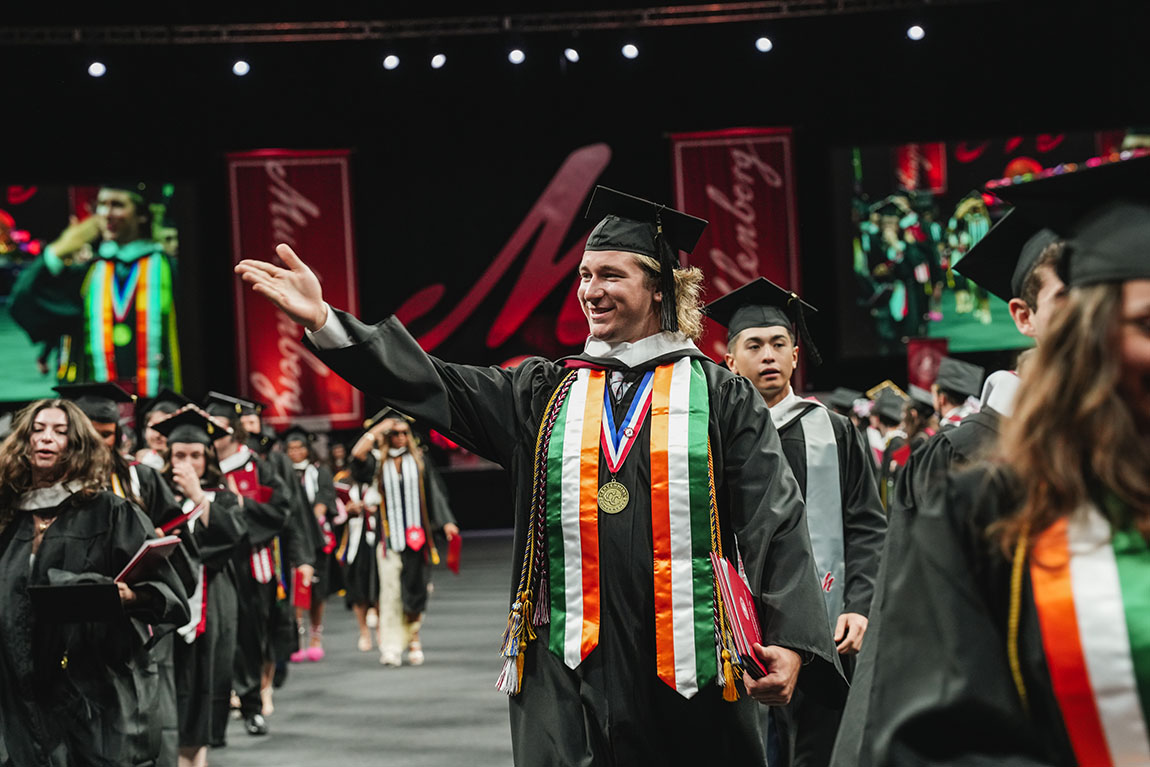
William “Chip” Gruen, professor of religion studies and director of the Institute for Religious and Cultural Understanding, earned the Paul C. Empie ’29 Memorial Award for Excellence in Teaching. The award is given in memory of the Rev. Paul C. Empie, graduate of the Class of 1929, a member of the College’s Board of Trustees for many years and its chair from 1972 to 1979.
Emanuela Kucik, associate professor of English and Africana studies and director of the Africana Studies Program, earned the Christian R. and Mary F. Lindback Foundation Distinguished Teaching Award. The Lindback Award honors a full-time faculty member each year who exhibits a commitment to excellence in classroom teaching and a personal concern toward students’ learning.
In addition to Richardson, Tom Graves ’76, an author and photographer, received an honorary degree.
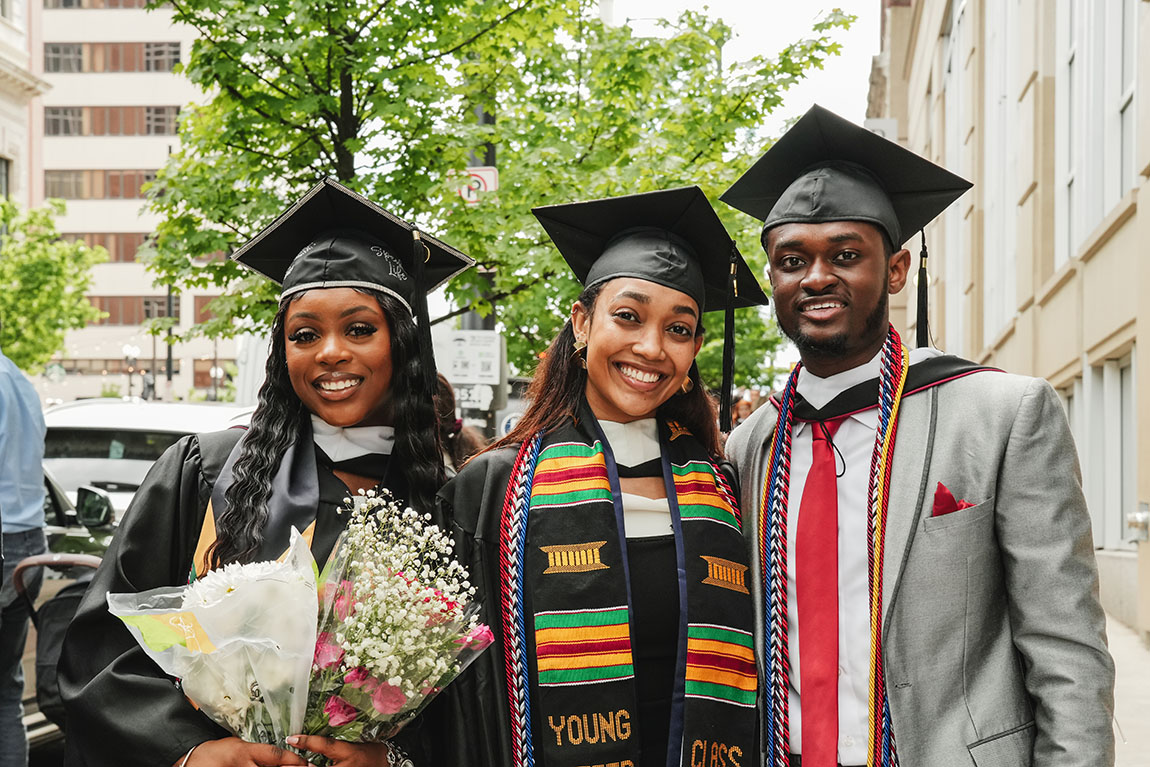
In her closing address, Harring also recalled the unusual circumstances of the class’s arrival on campus. One reason that the distancing required by Fall 2020 semester was so challenging, she said, is because of the characteristic closeness of the Muhlenberg community: “We thrive on proximity, conversation and interaction,” Harring said. “Indeed, a Muhlenberg liberal arts education is a contact sport.”
“Like the liberal arts, life is a contact sport. So make contact. Play the game. Be the Mules our world desperately needs.”
—President Kathleen Harring
She explained that the College’s small liberal arts environment runs on the face-to-face interactions and familiarity with others that were hard to come by in 2020. That, while such contact can sometimes cause friction, what makes the Muhlenberg community distinct is how it responds: “We create and test competing theories and arguments. We develop habits of mind that are systematic, evidence-based and grounded in reason. We engage in dialogue that is thoughtful and scholarly,” she said. “We don't always agree with one another. But we strive to create a forum that is brave and rooted deeply in our values.”
Harring encouraged graduates to carry the skills and values their time at the College instilled in them into their personal and professional lives.
“Like the liberal arts, life is a contact sport,” Harring said. “So make contact. Play the game. Be the Mules our world desperately needs.”
